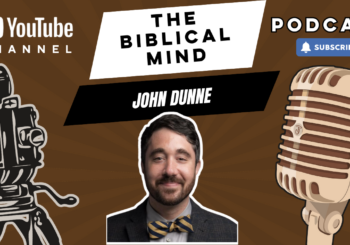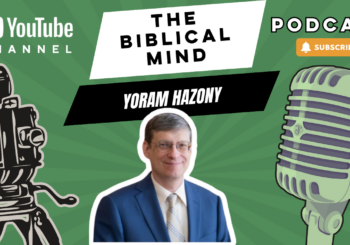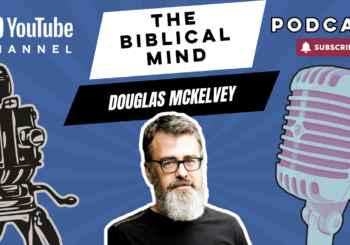Part of the 6 Jewish Thinkers All Christians Should Know series
Living with the Text: Leon Kass’s Model for Attentive Listening to the Bible
Leon Kass offers a model for listening to Scripture that is, in my experience, rare among Christians. This model and its fruits are on full display in two unique commentaries Kass has written: The Beginning of Wisdom: Reading Genesis (New York: Free Press, 2003) and Founding God’s Nation: Reading Exodus (New Haven: Yale University Press, 2021).1Kass has literally just published a new book on Ruth that he co-authored with Hannah Mandelbaum (his granddaughter): Reading Ruth: Birth, Redemption, and the Way of Israel (Philadelphia: Paul Dry Books, 2021). Yes, I am recommending that you get hold of and read a pair of commentaries, but readers should not be intimidated by this. Kass’ prose is easy to read and those familiar with biblical commentaries will immediately realize that Kass’ commentaries are unlike others. Kass’ model for attentive listening to Scripture in these two books is what I will explore in this article and commend to readers.
Enjoying this article? Read more from The Biblical Mind.
What Has a Bioethicist to Do with the Bible?
What may surprise you is that Leon Kass is not a biblical scholar. Kass (MD, University of Chicago and PhD in biochemistry, Harvard) has a distinguished career in the fields of medicine and bioethics (chairing the President’s Council on Bioethics from 2001-2005 and holding various professorships and fellowships in the area of bioethics). However, when the editors of The Biblical Mind distinguished Kass as one of 6 Jewish Thinkers all Christians should Know, I don’t suppose they had his work on bioethics in mind.
A deeper thread runs through Kass’ work and career. Kass seems driven by a pursuit of the most foundational questions of life: What does it mean to be human? What is the good life? How do we live worthy lives in the face of the challenges of our day? Perhaps not surprisingly, the pursuit of these questions drove Kass to the foundational texts and big ideas of the Western intellectual tradition and, at some point, turned his attention to the foundational text behind those foundational texts, namely, the Bible.
Given his biography, we might suppose that Kass’ turn to the Bible is also not too surprising as Kass himself admits he was raised in a “Yiddish-speaking and proudly Jewish home,” but it was a “secular” home and for some time he regarded “all religion as superstition.”2Leon R. Kass, Founding God’s Nation: Reading Exodus (Yale University Press, 2021), ix. Why then the turn to the Bible? It was Kass’ intellectual curiosity (and I dare say intellectual integrity) that inspired him to consider the Bible and give it a place alongside Plato, Aristotle, Lucretius, Descartes, Bacon, Rousseau and co. in the canon of essential texts in the Western philosophical tradition. As Kass himself says, it had become clear that “the Bible also had an ‘anthropology,’ an account of the human being, embedded in its account of the good life. The Bible belonged in conversation with these philosophical texts, where, I began to suspect, it could more than hold its own.”3Leon R. Kass, The Beginning of Wisdom (New York: Free Press, 2003), xii.
Kass’ two commentaries are the fruit of decades of sitting alongside friends and fellows with the texts of Genesis and Exodus. In what follows, I aim to tease out the principles of Kass’ approach for reading the Bible, principles from which all Christians can fruitfully learn.
6 Things All Christians Should Know about Kass’s Reading Approach
As the preface to his two commentaries, the long list of acknowledgements, and endnotes attest, Kass is committed to reading the Bible in community. It seems his readings of Genesis and Exodus have been profoundly influenced not only by seasoned teachers but also by fellow travelers and Kass’ own students (he explicitly acknowledges “students, friends, and colleagues”4Kass, Founding God’s Nation, xi.). Of course, anyone familiar with biblical commentaries knows that the footnotes and bibliographies can be extensive; however, one gets the sense that Kass is at least as indebted to real life conversation partners and reading groups as he is to scholarly works.5This is not to diminish Kass’ scholarly indebtedness, but this sense is derived from footnotes that acknowledge insights from countless individuals. To take just one example, in the preface to his Genesis commentary, Kass acknowledges the debt he owes to his wife, noting, “So often I have made her insights and questions my own that I no longer know where any one of those written here—or at least the good ones—originated” (p. xiv). Still, in four footnotes in the commentary he explicitly gives credit to his wife for insights he has gained from her (pp. 275 fn. 4; 414 fn. 11; 444 fn. 50; 465 fn. 13. Kass’s approach resists the tendency toward individualism in Christian readings of the Bible and insists (at least implicitly) that insights emerge most naturally in community.
Kass is committed to slow, attentive, and reflective (and self-reflective) reading of the Bible. The wonderful turn of phrase he uses for this is “living with” the text. This way of reading not only yields insights into the text but also yields insights into the reader. Kass puts it this way, “As a result of reading after the fashion I always recommend to my students, I have lived with the book and allowed it to work on me. My experience of Exodus, especially in the last few years, has revised my sense of what it is about. And it has changed me.” Kass lived with Genesis for 20 years before writing his commentary on Genesis and lived with Exodus for as many years before writing his commentary on Exodus (almost three times as many years as Jacob worked for Laban before proving himself worthy to marry Leah and then Rachel!). The result? Kass writes:
[H]aving now for years entered sympathetically into the story, inhabited the characters, discussed their experiences with diverse colleagues and generations of students, pondered the law, and thought with the text and not just about it, I have felt it change my feelings and thoughts about important matters. Precisely because the world of the text is so different from my own . . . it has proved to be a powerful mirror in which to look at my own complacent understandings of significant subjects. By giving me a world that is not graspable by my familiar concepts, it has forced me to reconsider many previously unexamined notions and prejudices.6Kass, Founding God’s Nation, 11.
This slow, reflective and self-reflective reading is, I’m convinced, how the biblical mind becomes properly shaped, how we may hope to be guided by Hebraic thought!
Christians are too often influenced by our insta-culture even in our reading of the Bible—we want the goods and we want them quickly. We should learn from Kass that genuine, transformative Bible reading cannot be rushed and requires expansive reflective space.
Kass attends closely to the text itself (and its literary features and design). It is clear that decades of “living with” Genesis and Exodus has produced for Kass an intimacy with these texts. Much like an old friend whose thought patterns we come to anticipate and whose sentences we can complete before they are uttered, Kass has a deep knowledge of these texts and how they work. He can detect patterns (and deviations from patterns), he is sensitive to words and word plays, he spots and describes deliberate ambiguity, he interprets the text’s periodic silences, etc. He briefly outlines his reading approach in his Exodus commentary (pp. 7-12) which provides key assumptions and reading practices. In sum, he regards himself “as an integral participant of the book,” a necessary requirement, according to Kass, “for the text to come fully alive.”7Ibid., 11. Serious students of the Bible ought to read this section of Kass’ book and then see his method on display throughout his commentaries.
This careful attention to the literary dimension of the Bible is fortified by Kass’ keen understanding of the historical/cultural background of the text (for example, the deliberate undermining of sun and moon worship in the creation account in Genesis 1 or the similar undermining of the Egyptian gods in the story of the ten plagues). Kass engages matters of historical background not as interesting tidbits of information; rather he leverages historical insights for the purpose of understanding and illuminating the text.
Being involved in church leadership and having taught undergraduates at a Christian liberal arts university for some ten years, I am often baffled at resistance (whether implicit or explicit) to attending to the literary features of the Bible and matters of historical background. These matters seem to be regarded as distracting from the “theological” teaching of the Bible. Kass demonstrates how attention to these aspects of the Bible by no means detracts from but actually enhance our ability to hear these texts properly and with their full instructional and theological force!
At the heart of Kass’ project is a “philosophical” approach for reading Genesis and Exodus according to which he seeks from these books answers to the big questions of life. Lest we get distracted by “philosophy” in this regard (and my hunch is that many Christian readers will find this a hurdle), Kass clarifies that his philosophical approach means reading with a wisdom-seeking and a wisdom-loving spirit.8Kass, Beginning of Wisdom, 1. And this wisdom is not the unaided human reason of modern science but the Hebraic notion of wisdom that begins with “awe and reverence” and has as its goal “not understanding for its own sake but rather a righteous and holy life.”9Ibid., 3. To put it another way, this approach is a “whole-hearted pursuit of the truth about the world and our place within it, in search of guidance for how we are to live.”10Kass, Founding God’s Nation, 3.
For example, Kass regards the stories of Genesis 1-11 as paradigmatic stories of the human predicament—they show us “not so much what happened as what always happens.”11Kass, Beginning of Wisdom, 10. Even the stories of the patriarchs in Genesis 12-50 or of the founding of the nation of Israel in Exodus are not so much particular histories for history’s sake; rather in and through these texts, “a new way of acting and standing in the world is established and transmitted for several generations through the education of the patriarchs, an education in which we readers may vicariously and reflectively participate.”12Ibid. In other words, the “new way” offered to Abraham, Isaac, Jacob and the people of Israel, is a “way” that the text summons readers today to follow. What is clear from Kass’ reading of the Bible is that its teachings address us, its ideas concern us, its narratives, poetry, etc. express truths that pertain to us (the first-person plural seems unavoidable in Kass’ writing).
Christian readers who are used to pillaging the Bible for mere spiritual nuggets, inspirational stories, or moral tales might be unsettled by the sheer magnitude of the questions Kass asks of these texts and the profound answers the texts yield. Kass examines Genesis and Exodus for answers to questions of ontology (what is the nature of reality?), anthropology (what does it mean to be human?), epistemology (how do we know things?), ethics (how do we live worthy lives?), civics/politics (what are the principles of a just society and how do we live together for the sake of the common good?), and so on. Kass’ wisdom-seeking approach is probably what sets his commentaries so radically apart from typical Christian readings of the Bible; it is also where we can learn the most from Kass.
Because of the nature of the questions he is pursuing, Kass’ reading method opens up the public teachings of the Bible. The Bible is public truth and Genesis and Exodus yield insights of a public nature. Christians in the modern West have been traditioned to privatize and individualize the teachings of the Bible. Motivated by his wisdom-seeking approach, Kass relentless pursues what Genesis and Exodus teach us today about politics, leadership and governance, economic and labor practice, agriculture, law, ritual, science, art, time, and more–all in a way that is surprisingly relevant. God’s new way for humanity displayed in Genesis and Exodus encompasses all of private and public life! Kass provides a much-needed correction to the reductionism and domestication of the Bible and can help us recapture the vastness and depths of the Bible’s public teachings.
Take up and Read—with a Warning for Christian Readers
It should be obvious by now that I think Kass’ reflections on Genesis and Exodus and his reading approach are worthy of the attention of Christian readers of the Bible. Perhaps a few words of qualification are in order. By commending Kass’ work, it should go without saying that I am not utterly convinced by every interpretation he offers or every interpretive move he makes. For example, Kass will elaborately speculate on “silences” in the text—sometimes he does this with sheer brilliance and at other times he is less convincing. And yet, I find him productively stimulating even in places where I find him less than convincing.
In general, I suspect many Christian readers will find Kass’ work disorienting. I have already identified some of the reasons for this in describing his reading method. Kass often asks questions of the biblical text that do not typically occupy Christian readers (though which are in many cases closer to the purpose of the biblical text than the ones Christian readers bring). Moreover, I sense there may be a kind of midrashic sensibility behind Kass approach that at times allows for ambiguity or even multiple interpretive possibilities that sit in tension with one another. Although disorienting, even here Christians can appreciate the complexity of (some texts of) the Bible and can be discipled in the way of interpretive humility. Finally, as committed followers of Jesus Christ what possibly could we learn about reading the Bible from a Jewish interpreter? Apart from stating the obvious (i.e., the authors of the New Testament where all Jewish interpreters, with the possible exception of Luke!), I would encourage Christian readers to pick up Kass commentaries and see for themselves; the proof of the pudding is in the eating! There is a tradition in Christian history of understanding the church as our mother (it goes back to at least the third-century bishop Cyprian and affirmed by Calvin and others)—if the church is indeed our mother, then we might regard Kass as a brother from another mother, and brother Leon is indeed a Jewish thinker whose work we should know.
End Notes
1. Kass has literally just published a new book on Ruth that he co-authored with Hannah Mandelbaum (his granddaughter): Reading Ruth: Birth, Redemption, and the Way of Israel (Philadelphia: Paul Dry Books, 2021).
2. Leon R. Kass, Founding God’s Nation: Reading Exodus (Yale University Press, 2021), ix.
3. Leon R. Kass, The Beginning of Wisdom (New York: Free Press, 2003), xii.
4. Kass, Founding God’s Nation, xi.
5. This is not to diminish Kass’ scholarly indebtedness, but this sense is derived from footnotes that acknowledge insights from countless individuals. To take just one example, in the preface to his Genesis commentary, Kass acknowledges the debt he owes to his wife, noting, “So often I have made her insights and questions my own that I no longer know where any one of those written here—or at least the good ones—originated” (p. xiv). Still, in four footnotes in the commentary he explicitly gives credit to his wife for insights he has gained from her (pp. 275 fn. 4; 414 fn. 11; 444 fn. 50; 465 fn. 13.
6. Kass, Founding God’s Nation, 11.
7. Ibid., 11.
8. Kass, Beginning of Wisdom, 1.
9. Ibid., 3.
10. Kass, Founding God’s Nation, 3.
11. Kass, Beginning of Wisdom, 10.
12. Ibid.
Did you enjoy this article? Check out The Biblical Mind podcast.





